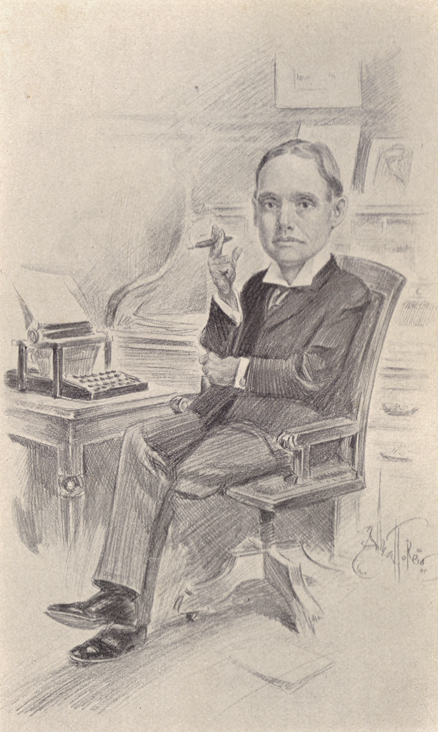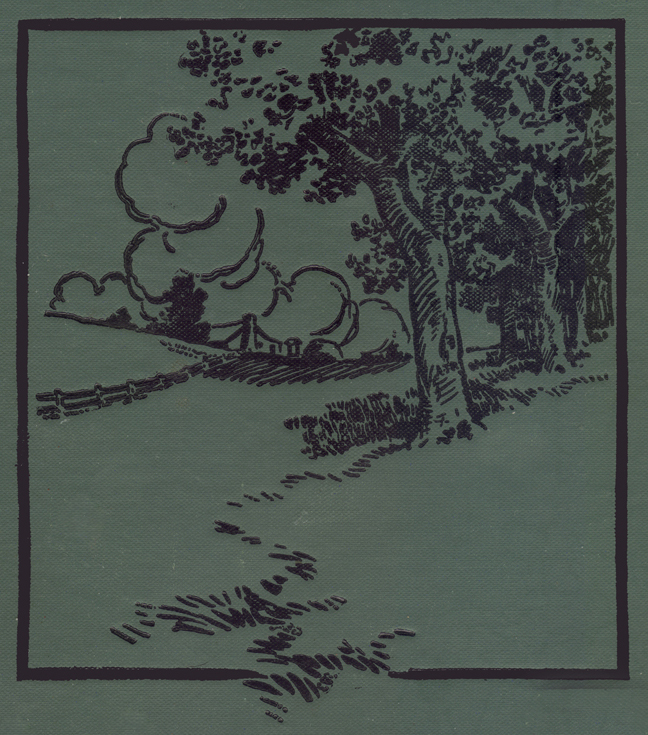
From At the Grass Roots, Comprising “The Christmas of 1883,” and Other Vagrant Sketches, by Elmer House (Dodd Gaston), with Cover Design and Frontispiece by Albert T. Reid, Topeka: Monotyped by Crane & Company, 1905; pp. 128-132.

The Girl sifted wearily into the restaurant and sat down across the table from the Man who was eating a midnight lunch. The feather in her hat was broken and awry, her hair was in disorder, and her jacket was pitifully cheap and coarse. There was a haggard, dejected look on her face — a face that might have played havoc with men’s hearts under different circumstances. The Man recognized her: she had stood fourth from the left lower entrance in the chorus of the “Googly-Goo” company at the theater that night.
Meanwhile, other members of the chorus had sifted as wearily in, and had sat down to the various tables about the room. They were typical of their kind, which is to say that they were poorly dressed and unattractive off the stage. Some were talking loudly, but most of 129 them were quiet and unobtrusive. The Man knew the kind and gave them little heed, but there was something in the face of the Girl opposite that attracted and held his sympathy.
She was a little thing: she could not have been more than nineteen or twenty, and for all her cheap, tawdry clothes and the slovenly hair there was about her the indefinable touch which only good breeding can give. It may be that the Girl recognized the sympathy in the Man’s face. It may be that the reserve which dammed the flood-gates of her soul had finally given away before the torrent of her woe. At any rate, she looked across the table and asked the man if he lived in Topeka. It was not the place or occasion for a question of that sort, but it did not suggest to the Man the thing it might have suggested, and he answered her kindly.
“What I want to know,” continued the Girl, “is, could an honest girl get a 130 job in this town and earn her living? I want to cut this out. I can’t stand it much longer. I ran away from my home in Michigan last spring and joined a company that played the town. I had hung around the theater and met two or three of the men, and I was crazy about the stage. I had always been crazy about it, for that matter. I could sing pretty well and dance a little, and I had been in a good many amateur entertainments. The home papers always praised me a good deal, and it spoiled me for anything else.
“Well, I joined the company at a town twenty miles away, and to this day my people don’t know what became of me. The company kept going up to July in a hand-to-mouth sort of way, and I managed to live, but it was awful. During the summer I got an occasional engagement at one of the summer theaters, but there were a lot of times I went hungry. In the fall I caught on with ‘Googly-Goo,’ 131 and it seems to me we’ve played a thousand one-night stands since.
“I get $15 a week. My board never costs less than $7; sometimes it costs $10. Laundry bills and incidentals eat up most of the balance. I can’t even dress myself comfortably on what is left. I spend my time between a cold, cheerless room at a cheap hotel, the day coach on the train, and the dirty dressing-rooms of some third- or fourth-class theater. Between times I am cursed and abused, and every man I meet seems to regard me as lawful prey. I’ve stayed honest and decent, but I can’t go back home. It’s a little town, where everybody knows everybody’s business, and the gossip about me would drive me mad. I simply can’t face that, and I can’t keep this up. I’d rather die than go on.”
That’s all there is to the story, but there should be a lesson here for the girl who is stagestruck. Incidentally it may be mentioned that the “Googly-Goo” 132 company was “shy” one chorus girl when it went on to Denver, and that up in a little Michigan town there was one home where Thanksgiving Day, had a real meaning.
